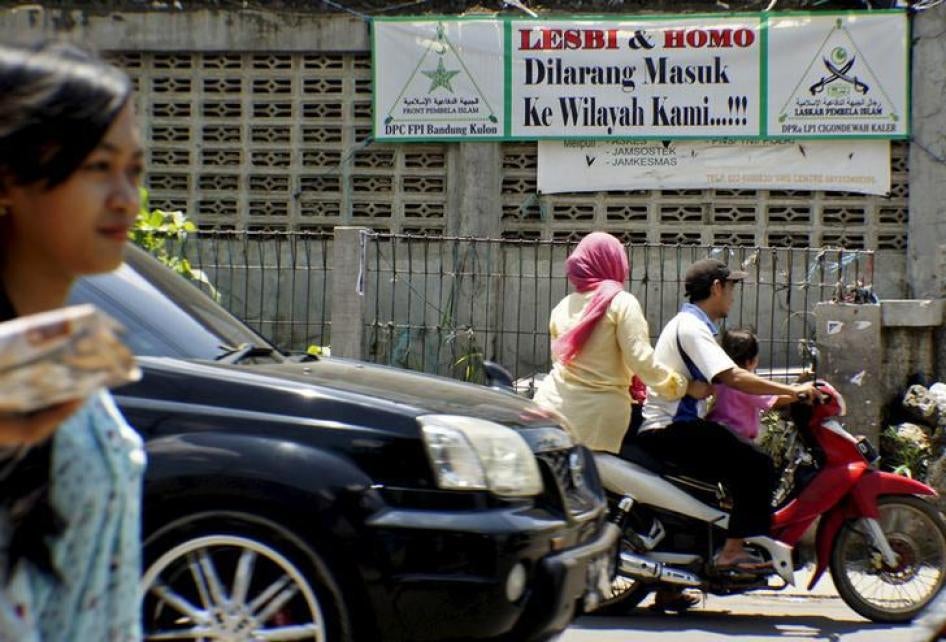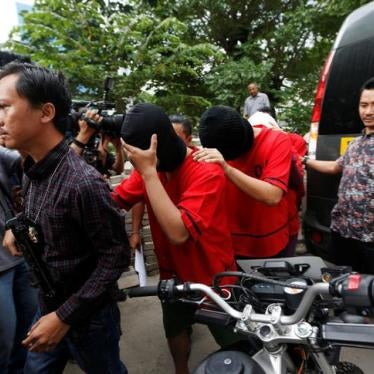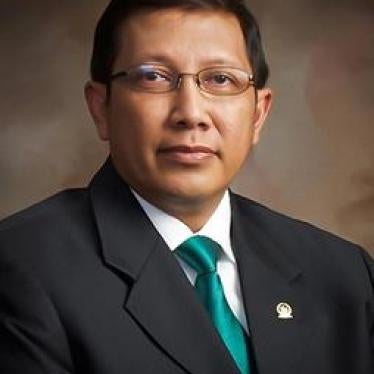It may seem preposterous, but some Indonesian politicians are attempting to portray the criminalization of adult consensual same-sex conduct as somehow protecting against vigilantism. Make same-sex behavior a crime, they say, and conservative elements will be placated, avoiding violent outbursts. If there is an official route to report and prosecute lesbian, gay, bisexual and transgender (LGBT) people, the logic goes, members of the public won’t resort to attacks.
The argument has a certain appeal amid Indonesia’s intensifying moral panic about sexuality, but the substance makes no sense whatsoever –especially considering Indonesia’s unrelenting government-driven campaign of vitriolic rhetoric against LGBT activism and people . But while politicians spin their current decision-making as horse trading and political compromise, their policy proposals echo the deeply problematic historical relationship between Indonesia’s laws and vigilante attacks on minorities – and portend a violent future.
In late January, Zulkifli Hasan, speaker of Indonesia’s parliament, who had been one of the first public figures to launch an anti-LGBT diatribe in 2016, told reporters that there were parliamentarians discussing same-sex marriage – a triggering issue in Indonesian political discourse. In 2017 social media erupted with calls to boycott Starbucks, for example, because the coffee company’s CEO had four years earlier declared his support for marriage equality. Hasan’s statement that legislators were discussing same-sex marriage was not true, but in Jakarta’s political chess match, it effectively cornered all players into publicly affirming their support for some degree of opposition to gay equality.
One member of parliament, a representative from Aceh province, suggested the death penalty. Aceh’s position is extreme; it is the only province in Indonesia allowed to implement Sharia (Islamic law) and the 2014 local criminal code includes punishments for adult consensual same-sex conduct, as well as clauses that encourage community enforcement and “snooping,” which has led to widespread vigilante actions and, in 2017, Indonesia’s first public flogging for homosexuality.
Other lawmakers proposed complete criminalization of sex outside of marriage, with extra penalties if it is between two people of the same gender – an anti-adultery law, with an anti-gay provision. A group called the Family Love Alliance brought a similar proposal to the Constitutional Court in July 2016, where justices rejected it 5-4.
Some other legislators involved in the criminal code revisions proposed what they see as a compromise. As Ichsan Soelistio, a parliamentarian from Indonesia’s largest political party, Indonesian Democratic Party for Struggle (PDIP), and one of the members working to update the country’s criminal code told the Washington Post last week: “[We] have agreed to accept a law which allows prosecution of sex outside marriage and homosexual sex, but only if one of the sexual partners or their family members report the crime to police.”
Soelistio, who is a member of President Joko Widodo’s party, calls this version of the law “a firewall.” Without it, he insists, “the public can try to take the law into their own hands” and attack LGBT people.
The proposal is eerily similar to how Indonesian politicians have attempted to spin the country’s notorious blasphemy law as a stabilizing force and a preventative measure against vigilante violence. In 2008, the government also issued an anti-Ahmadiyah regulation, reasoning that it would prevent vigilantes attacking the Muslim minority community, often accused of committing blasphemy against Islam.
The blasphemy law, article 156a of the Indonesian criminal code, was passed in 1965 and punishes deviations from the central tenets of Indonesia’s six officially recognized religions with up to five years in prison.
In 2009, when Muslim intellectuals challenged the blasphemy law in the Constitutional Court, government witnesses defended the law, saying Muslim mobs would probably attack religious minorities if the blasphemy law were overturned because ordinary Indonesian Muslims believed it was their duty to defend Islam. Ultimately, in 2010 the court ruled 8 to 1 that the blasphemy law lawfully restricted minority religious expression because it allows for the maintenance of “public order.” The court agreed that without it, religious minorities could become targets of violence by intolerant members of the public.
In fact, the exact opposite has happened – repeatedly.
Militant Islamist groups and community vigilantes have violently targeted Ahmadiyah, Gafatar, Christian, Buddhist, Confucian and other religious minorities. For more than a decade, police, military, and other authorities have failed repeatedly to defend these religious communities, investigate the attacks, and bring perpetrators to justice. Meanwhile, dozens have been prosecuted under the law for expressing minority religious views. The law has been an abject failure in theory and practice, and a source of violence, not protection.
In rejecting last year’s petition to criminalize homosexuality, Indonesia’s Constitutional Court said it was for parliament to decide whether to criminalize private sexual behavior, but warned against over-criminalization. “If one builds an argument that to maintain societal order is to force members of the society who acts in a manner considered deviant to change their behaviors through threats of criminal punishment,” the justices warned, “he or she basically believes that societal order can be created under repressive measures only.”
So, when legislators such as Soelistio suggest that “we are not banning gay people. We are trying to give them freedom within certain limits,” it rings not only hollow, but mendacious. The anti-LGBT campaign that began in 2016 has metastasized into outright violence – including police raids on night clubs that were HIV education and testing hubs, as well as private homes. At least 300 LGBT people were arrested last year.
Basic human rights aren’t a matter of political horse-trading, and protection is never achieved through criminal sanctions against minorities’ fundamental rights. It’s not freedom of expression versus security, or privacy versus dignity. Indonesia’s experience with the blasphemy law should be evidence enough to tip the balance back towards protecting human rights. Indonesia has never in its history criminalized adult consensual same-sex conduct: 2018 is not the year to do it.











